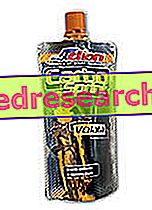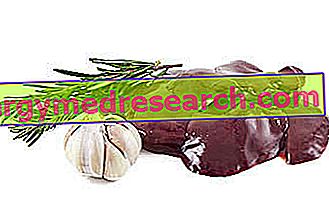
Information on Carbo Sprint Volata - ProAction
Carbo Sprint Volata - ProAction
Energy preparation based on carbohydrates with caffeine, L-carnitine, Vitamin C and Vitamin B6
FORMAT
Pack of 50ml red orange taste
Composition : Water - Dextrose - Fructose - Maltodextrin - L-Carnitine tartrate - Caffeine - Flavor - Acidifier: Citric acid - L-Ascorbic acid (Vit. C) - Pyridoxine hydrochloride (Vit. B6).
Per daily dose (75gr = 2 scoops)
Energy value: 115 Kcal - Proteins 0 gr - Carbohydrates 25 gr (of which Dextrose: 17.5 gr - Fructose: 3.75 gr - Maltodextrin: 3.75 gr) - Fats 0 gr - L-Carnitine: 100 mg - Caffeine: 80 mg - Vitamin C : 1.8 mg - Vitamin B6: 0.6 mg.
Carbohydrates - are among the most abundant nutrients in the common diet. Their importance is due to the energy and structural functions that guarantee the correct functioning of the various devices.

Naturally present in foods, carbohydrates are introduced mainly in the form of starches, through cereals and derivatives, and simple sugars using fruit. A healthy diet can satisfy even the most demanding requests, as long as the choice of ingested carbohydrates respects the fragile metabolic and hormonal balance of the human body. The situation becomes even more complex for the sportsman, where the choice of the glucose inevitably falls on his nutritional and athletic condition, and significantly affects the performance. In order for this to be improved it is necessary to choose the sugar that best suits the sports context:
- simple sugars of rapid absorption such as dextrose, whose blood peak occurs a few seconds after ingestion, should be taken a few moments before a sprint or a maximal act of force;
- more complex carbohydrates such as maltodextrins, or more slowly metabolized such as fructose, could be taken before and during an endurance performance, so as to provide a gradual release of energy, sustain performance for longer periods and reduce catabolism as much as possible muscle.
However, carbohydrates also play an important role in the phase immediately following training, where they can be used to promote insulin secretion and facilitate the recharge of depleted glycogen.

Its main biological role, fundamental for the intermediate metabolism, takes the form of binding long chain fatty acids and transporting them through a membrane transporter into the mitochondrial matrix, where they will undergo oxidation, energetically supplying the cell. Lipid metabolism plays a key role in the body's energy balance, representing the chosen source during aerobic activity, especially if it lasts over time. In these conditions, in fact, carnitine levels tend to decrease in favor of the acetylated form, which indicates an increased need for this molecule. Despite the different biological indications, and the numerous studies present in the literature, supplementation with L-carnitine does not seem to give the expected results in terms of improving aerobic performance, presumably due to the poor storage capacity at tissue level.

Before being metabolised in the liver in various forms of dimethylxanthine, caffeine is able to:
- Produce a stimulating action on adrenergic metabolism;
- Stimulating lipolysis, increasing the blood concentration of fatty acids;
- Mediate vasodilation at the muscolar level;
- Release the bronchial muscles, and facilitate breathing;
- Improve cognitive skills and state of alertness;
- Increase diuresis;
- Reduce the sensation of pain by limiting the activation of nociceptors.
Given the numerous reactions in which it is more or less directly involved, and the simple availability, caffeine has found application in the sports field, so much to be counted among the doping substances at urinary concentrations above 0.012 mg / ml. The advantages in sports are reflected in an improvement in performance both in terms of strength and resistance, in an improvement in the state of attention and in a reduction in the feeling of fatigue. The maximum safe dose used in the studies is 300 mg, beyond which there are tremors, anxiety, tachycardia, insomnia and excitement. On the other hand, prolonged use is an important risk factor for diseases of the gastro-intestinal, cardiovascular and nervous tract (migraine).

- powerful antioxidant, through the regeneration of vitamin E, able to effectively counteract the damage induced by intense physical exercise;
- cofactor necessary for the synthesis of carnitine
- reducing intestinal iron, with consequent increase in absorption levels;
- reducing folic acid in its coenzymatic forms.
The aforementioned effects take the form of a reduced feeling of fatigue and a consequent improvement in performance.
The daily requirement of vitamin C is estimated at around 60-90mg, but even at just 10mg it is able to prevent scurvy, a disease derived from vitamin C deficiency. These recommended levels of intake can increase significantly in athletes even reaching the gram daily. However, it should be considered that dosages higher than the net gram are accompanied by a significant reduction in intestinal absorption.
Gastro intestinal disorders due to the acidity of this vitamin, are recorded for pharmacological dosages, ie higher than 10 gr / day
Vitamin B6 : introduced in supplements mainly in the form of pyridoxine hydrochloride, and present mainly in foods of animal origin, particularly in meat. This vitamin is absorbed at the level of the jejunum after dependent ATP hydrolysis and transported to the liver via albumin. At the hepatic level, vitamin B6 undergoes phosphorylation processes which transform it into the active form, known as pyridoxal phosphate, therefore, once transported to the various tissues, it acts as a cofactor:
- Favoring glycogenolysis and gluconeogenesis, in order to increase the availability of glucose;
- Supporting hormonal action;
- Facilitating the synthesis of other B vitamins, such as niacin;
- By guiding the synthesis of the EME group, it is necessary for hemoglobin to bind oxygen.
Its daily requirement is around 1 / 1.5 mg, but even in this case the cases of deficiency are very rare.
Product features - Carbo Sprint Volata - ProAction
From the name it is easy to understand how this product is born to support the final sprint of a performance. The reduced proportion of maltodextrins, in favor of a simple and immediately available sugar component - together with the presence of caffeine and L-Carnitine, and the absence of branched chain amino acids - supports the role for which this supplement was born. The presence of vitamins should also guarantee both an optimization of the energy and oxidation processes, and a potential detoxifying and anti-fatigue effect. However, despite the theoretical assumptions and encouraging data regarding the ergogenic efficacy of carbohydrates (in particular the maltodextrin / fructose mixture) and caffeine, it is necessary to remember the low efficacy of carnitine-based supplements, the different timing of absorption of the various principles contained, and the absence of experimental studies that characterize its usefulness.
Suggested use by the company - Carbo Sprint Volata - ProAction
1-2 packs per day.
Use in sports - Carbo Sprint Volata - ProAction
This type of supplement should be consumed during athletic performance, and in particular immediately before the final phase of the race. The prevalence of simple sugars, in fact, exposes the athlete to potential risks of reactive hypoglycemia, which would be seriously disadvantageous for the pursuit of physical exercise.
Side Effects Carbo Sprint Volata - ProAction
Excessive consumption could cause nausea, cramps, abdominal pain, diarrhea and vomiting. This drink contains caffeine, whose side effects have been previously listed, and simple sugars, so it is not recommended to take it before going to bed or in the evening hours.
Precautions for use Carbo Sprint Volata - ProAction
The product is contraindicated in cases of renal or hepatic disease, cardiovascular disease and / or hypertension, during pregnancy, during lactation and under 14 years.
In the event of prolonged use (over 6/8 weeks), medical advice is required.
This article, elaborated on the critical re-reading of scientific articles, university texts and common practice, is for informational purposes only and is therefore not a medical prescription. It is therefore always necessary to consult your doctor, nutritionist or pharmacist before starting to use any kind of supplement . Further information on the critical analysis of Carbo Sprint Volata - ProAction.
| BIBLIOGRAPHY |
Med Sci Sports Exerc. 2006 Jul; 38 (7): 1288-96. Androgenic responses to resistance exercise: effects of feeding and L-carnitine.Wraemer WJ, Spiering BA, Volek JS, Ratamess NA, Sharman MJ, Rubin MR, French DN, Silvestre R, Hatfield DL, Van Heest JL, Vingren JL, Judelson DA, Deschenes MR, Maresh CM. J Strength Cond Res. 2008 Jul; 22 (4): 1130-5. Effects of L-carnitine L-tartrate supplementation on muscle oxygenation responses to resistance exercise. Spiering BA, Kraemer WJ, Hatfield DL, Vingren JL, Fragala MS, Ho JY, Thomas GA, Häkkinen K, Volek JS. Med J Aust. 2009 Jan 5; 190 (1): 41-3. Berger AJ, Alford K. Caffeine and taurine enhance endurance performance. Imagawa TF, Hirano I, Utsuki K, Horie M, Naka A, Matsumoto K, Imagawa S. Int J Sports Med. 2009 Jul; 30 (7): 485-8. Epub 2009 May 19. Sports Med. 2001; 31 (11): 785-807. Caffeine and exercise: metabolism, endurance and performance.Graham TE. Crit RevFood Sci Nutr. 2005; 45 (7-8): 535-62. Caffeine use in sports, pharmacokinetics in man, and cellular mechanisms of action.Magkos F, Kavouras SA. Laboratory of Nutrition and Clinical Dietetic Oxidation of combined ingestion of maltodextrins and fructose during exercise. Wallis GA, Rowlands DS, Shaw C, Jentjens RL, Jeukendrup AE. Med Sci Sports Exerc. 2005 Mar; 37 (3): 426-32. Pflugers Arch. 2003 May; 446 (2): 211-9. Epub 2003 Mar 4. Carbohydrate supplementation improves moderate and high-intensity exercise in the heat. Carter J, Jeukendrup AE, Mundel T, Jones DA. Carbohydrate mouth rinsing in the fed state: lack of enhancement of time-trial performance. Beelen M, Berghuis J, Bonaparte B, Ballak SB, Jeukendrup AE, van Loon LJ. Int J Sport Nutr Exerc Metab. 2009 Aug; 19 (4): 400-9. Carbohydrate ingestion during exercise does not delay the fatigue during the submaximal cycle exercise. Lacerda AC, Alecrim P, Damasceno WC, Gripp F, Pinto KM, Silami-Garcia E. J Strength Cond Res. 2009 Jul; 23 (4): 1276-81. J Physiol. 2009 Apr 15; 587 (Pt 8): 1779-94. Epub 2009 Feb 23. Chambers ES, Bridge MW, Jones DA. J Sports Med Phys Fitness. 2006 Jun; 46 (2): 248-56. Does a pre-exercise carbohydrate feed improve to 20-km cross-country ski performance?Francescato MP, Puntel I. Med Sci Sports Exerc. 2004 Dec; 36 (12): 2107-11. The effect of carbohydrate mouth rinse on 1-h cycle time trial performance.Carter JM, Jeukendrup AE, Jones DA. J Strength Cond Res. 2003 Feb; 17 (1): 20-5. The effect of liquid carbohydrate ingestion on repeated maximal effort exercise in competitive cyclists.Haub MD, Haff GG, Potteiger JA. Ergonomics. 2000 Oct; 43 (10): 1528-37. Effect of carbohydrate supplementation on simulated exercise of rugby league referees.MaClaren DPM, Close GL. This elite rugby league referees with a 6% maltodextrin (Md) solution while undertaking a simulated rugby league game Int J Sport Nutr. 1999 Sep; 9 (3): 241-50. The effect of a carbohydrate - arginine supplement on postexercise carbohydrate metabolism.Yaspelkis BB 3rd, Ivy JL. Int J Sport Nutr. 1997 Jun; 7 (2): 128-37. Glycemic and insulinemic responses to multiple preexercise carbohydrate feedings.Short KR, Sheffield-Moore M, Costill DL. Eight trained cyclists ingested 22.5, 45, or 75 total g maltodextrin and dextrose dissolved in 473 ml of water or an equal volume of placebo (PL) Eur J Appl Physiol Occup Physiol. 1997; 76 (6): 504-9. The effects of various beveragesJimenez C, Melin B, Koulmann N, Charpenet A, Cottet-Emard JM, Péquignot JM, Savourey G, Bittel J. Int J Sports Med. 1994 Nov; 15 (8): 466-71. Hormonal and metabolite responses to glucose and maltodextrin ingestion with or without the addition of guar gum.MacLaren DP, Reilly T, Campbell IT, Frayn KN. J Sports Med Phys Fitness. 1994 Sep; 34 (3): 263-70. Effect of carbohydrate ingestion on performance of non-fasted cyclists during a simulated 80-mile time trial.Langenfeld ME, Seifert JG, Rudge SR, Bucher RJ. Am J Physiol. 1991 Jun; 260 (6 Pt 1): E883-90. Carbohydrate supplementation, glycogen depletion, and amino acid metabolism during exercise.Wagenmakers AJ, Beckers EJ, Brouns F, Kuipers H, Soeters PB, van der Vusse GJ, Saris WH. Med Sci Sports Exerc. 1989 Oct; 21 (5): 540-9. Exercise and training effects on gastric emptying of carbohydrate beverages.Rehrer NJ, Beckers E, Brouns F, Hoor ten F, Saris WH. Oxidation of Solid versus Liquid Carbohydrate Sources during Exercise. Pfeiffer B, Stellingwerff T, Zaltas E, Jeukendrup AE. Med Sci Sports Exerc. 2010 Mar 19. [Epub ahead of print] Med Sci Sports Exerc. 2010 Apr 16. [Epub ahead of print] Carbohydrate Oxidation from a Carbohydrate Gel Compared To a Drink during Exercise.Pfeiffer B, Stellingwerff T, Zaltas E, Jeukendrup AE. Carbohydrate gel, it is absorbed and oxidized in the same way compared to a drink. |



